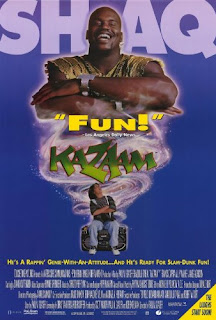Rotten Tomatoes score: 6%
This was the most confusing experience I've ever had watching a kids' movie. And, no, I'm not talking about the bizarre urban legend where people think this was a ripoff of a nonexistent Sinbad movie called "Shazam". I'm talking about the film itself.
The basic premise—basketball great and flat-earth troll Shaquille O'Neal is a magic genie who befriends a tough 90s kid with bad teeth—made perfect sense. But they kept throwing in new characters and subplots without warning or explanation, and the whole thing is cut together with the frenzied pace of a cheap music video. It gave me the feeling that I was watching a 3-hour movie that had to be cut down to 90 minutes in postproduction.
Like most tough 90s kids, our 12-year-old protagonist is named Max, and he has a strained relationship with his single mom. Within the first thirty seconds after the mom character is introduced, we learn that she is about to marry a firefighter named Travis, that Travis desperately wants Max to like him, that Max's mom has not yet finalized her divorce with Max's estranged father, that Max wants to reconnect with the father, and that mom has been trying to hide the fact that the dad has recently returned to New York from some other place.
Meanwhile, while fleeing from some bullies, Max falls through several rotten floors of an abandoned building, lands on the basement floor, and dies. He accidentally turns on a magic boombox, which is secretly inhabited by a 5,000-year-old genie named Kazaam. The genie uses his phenomenal cosmic powers to chase away the bullies and tells Max that he must make three wishes.
Kazaam seems eager to get the wishes over with so he can go back to haunting the magic boom box, so he hurriedly lays out the ground rules: he must grant Max's wishes; he can't show his magic to anyone but Max (a rule he has already violated); and he can only grant "material" wishes, as opposed to "ethereal" wishes. I don't know what that means. Anyway, for no explained reason, he is unable to grant Max's first wish (for a car), so Max blows him off and goes home.
Back in the unrelated dad plot, Max somehow figures out exactly where his dad is working, and he goes looking for him. Dad is a music producer or concert promoter or talent agent or something, and he has it in with famous rapper Da Brat. (Remember Da Brat? She was the musical guest on almost every episode of All That.) When Max finds his dad, the dad is delighted to see his long-lost son and gives him all-access passes to an upcoming concert.
Then, when Max actually attends the concert and tries to talk to his dad, the dad suddenly can't stand the sight of him and orders him away. Apparently, the dad's sudden animosity toward Max is instigated by his boss, Malik, who is really a mob boss, and who wants to steal Kazaam's magic boom box for himself. But then, Max has to steal a concert tape from the recording studio to give it to the school bullies for whatever reason. And Kazaam becomes a rapper and—
Forget it. I can't explain it. I have no idea what was happening. At the end of the movie, Malik murders Max. (I'm serious.) Kazaam wishes for Max to return to life, grants his own wish—even though he explicitly told Max earlier that he cannot raise the dead—and then transforms from a genie into an even more magical being called a jinn. And he also turns Malik into a basketball and... kills him? Does Malik die? Has anyone else seen this movie? Can you explain it to me?
All right, never mind the plot. Kazaam is not as bad as you've heard. Shaquille O'Neal really isn't bad in the part, and I liked the main kid and the mom. The special effects aren't very good, but they didn't bother me. I even kind of liked the in-your-face editing style that whipsaws the viewer from scene to scene without ever letting you catch your breath. But to pull off a style like that, you have to exercise great caution to make sure the basic plot elements don't get lost in the shuffle. Otherwise, people can't follow the story and they get distracted.
...Hey, remember Shaq Fu?

